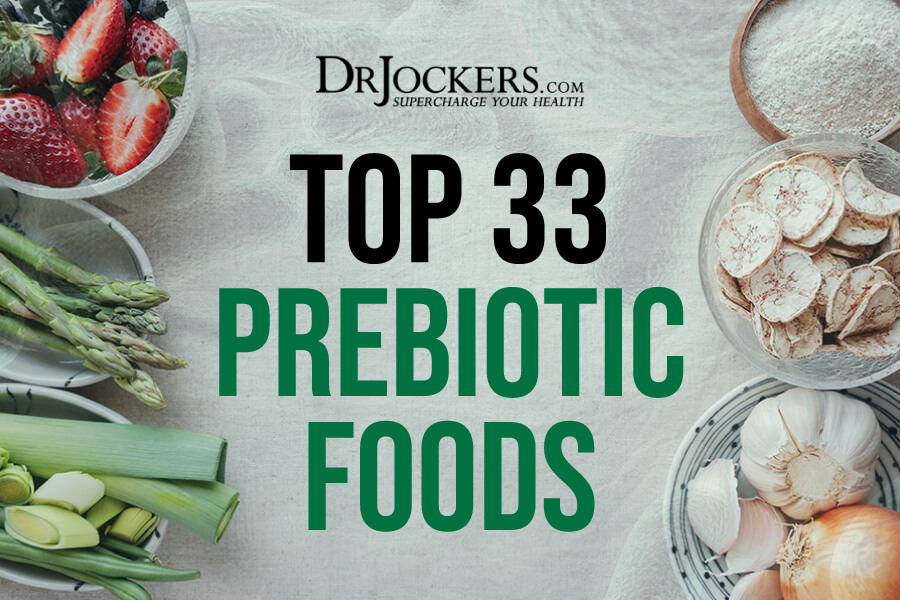
Prebiotic Foods: Better than Probiotics?
Prebiotic foods are one of the most important things we can focus our nutrition around. Many people today are receiving their daily dose of probiotic supplementation or at the very least understand that they probably should be. Less likely are people aware that they should also be receiving an optimal dosage of prebiotics.
Prebiotics have numerous health benefits such as improving gut health, inhibiting cancer, enhancing the immune system, and preventing obesity, and have shown effective improvements in 91% of all human trials. They have also been shown to reduce symptoms of bowel related issues such as ulcerative colitis, Crohn’s disease, irritable bowel syndrome, and celiac disease. (1)
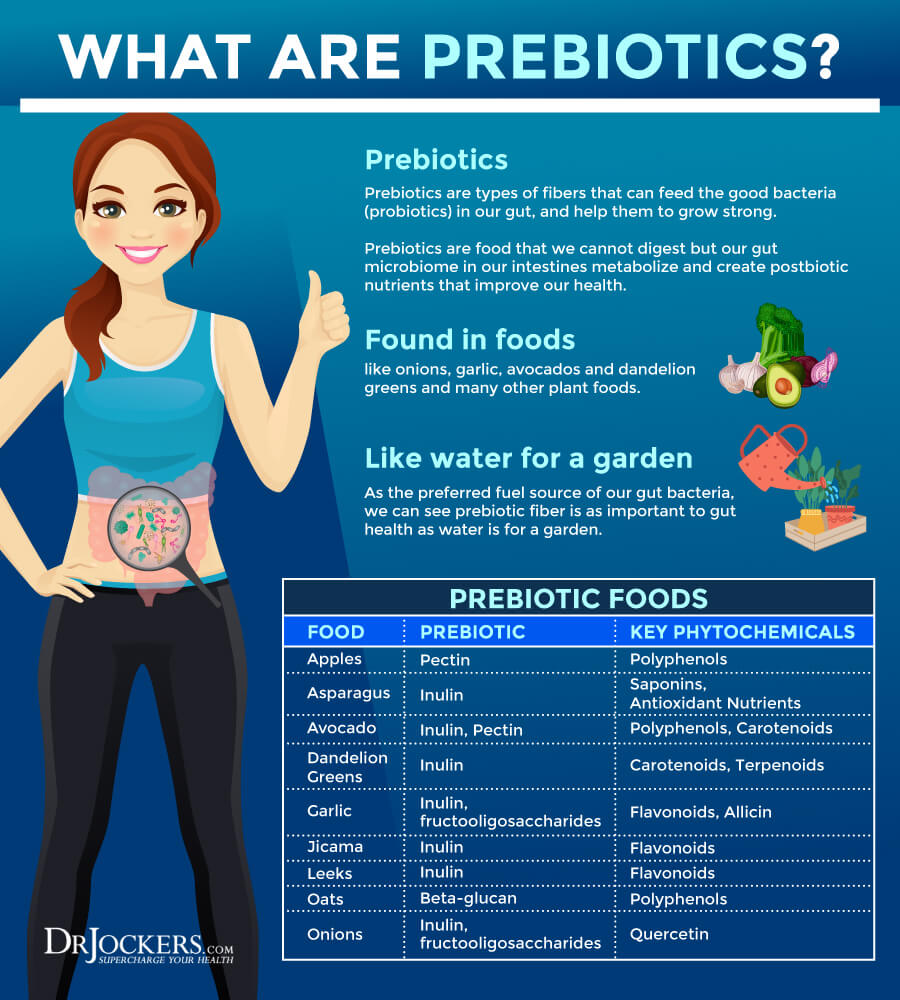
Prebiotics versus Probiotics
Both prebiotics and probiotics nurture the good bacteria required by the digestive tract for proper health beginning at the mouth. Probiotics are live, active cultures capable of multiplying in numbers whereas prebiotics serve as the food source for probiotics and do not grow or reproduce (2).
The difference between probiotics and prebiotics can be learned in a plant analogy. If the intestine is comparable to a flowerbed, probiotics are the individual seeds that you plant. Prebiotics work like fertilizer used to promote the growth of the flowers or probiotics. As the flower thrives, it will pollinate and multiply in time.
If you start out with fresh soil containing no flowers, it makes sense that you should first plant seeds and then add fertilizer. The same can be said in regards to creating a healthy intestinal environment for friendly bacteria to flourish. Remember, what purpose does it serve to add fertilizer to a flower bed with limited or no flowers to grow?
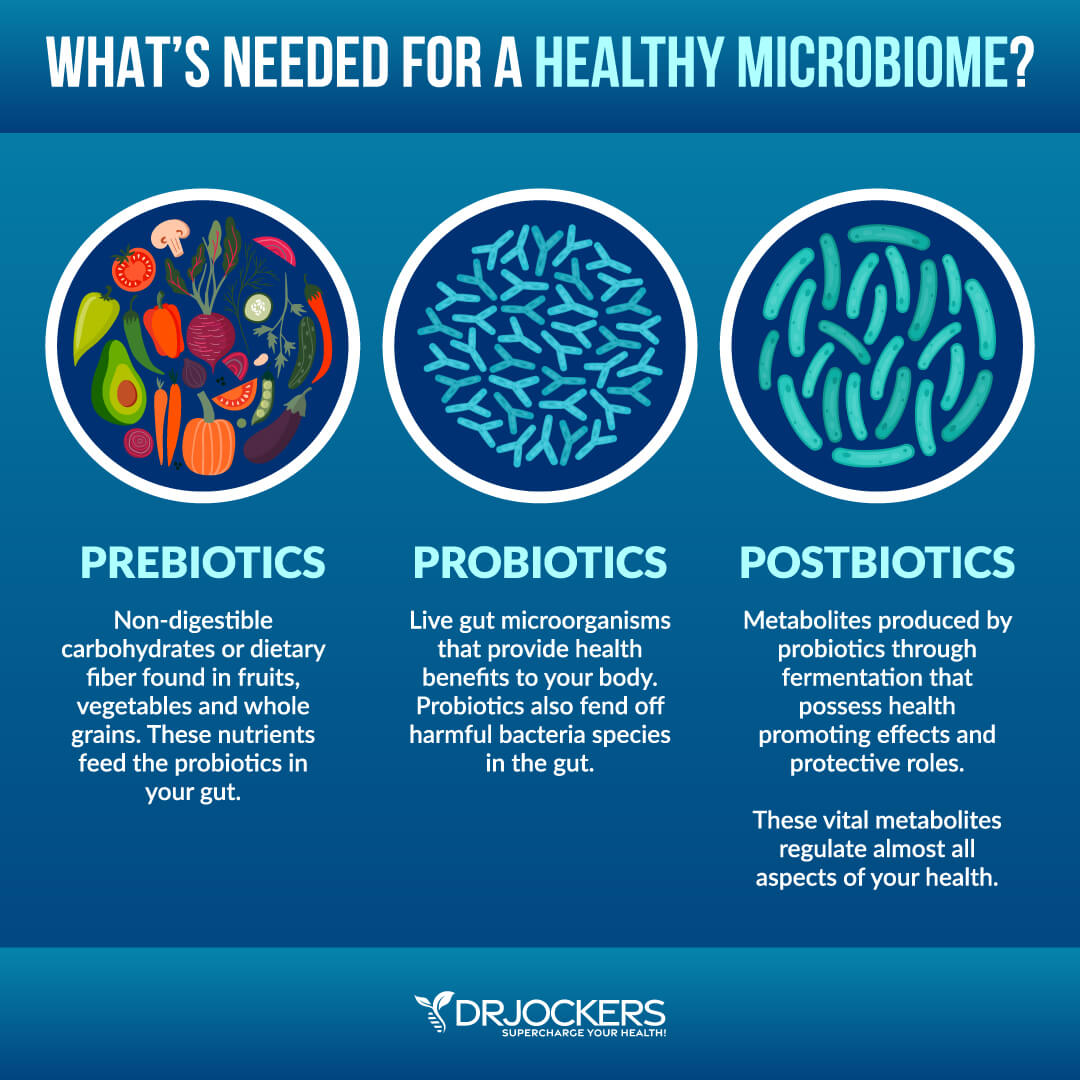
Food Sources of Prebiotics
According to regulation standards, prebiotics are made up of non-digestible carbohydrates (fiber) that are used by bacteria in the colon to produce measurable health benefits. Naturally found in food, a prebiotic is not broken down or absorbed by the gastrointestinal tract. Beneficial bacteria use this fiber as a food source in a process called fermentation. (1, 4, 5).
Prebiotics are considered functional foods in that they provide numerous health benefits and aid in the prevention and treatment of diseases and health conditions.
Currently, there are three major types of prebiotics that are well documented: inulin, oligosaccharides, and arabinogalactans. Examples of food sources that contain prebiotics are: (5)
- Onions
- Leeks
- Radishes
- Carrots
- Coconut Meat & Flour
- Flax and Chia Seeds
- Tomatoes
- Bananas
- Garlic
- Chicory Root
- Dandelion Greens
- Jerusalem Artichoke
- Jicama
- Asparagus
- Yams
Inulin and oligosaccharides are short-chain polysaccharides, or chains of carbs, which act at different locations in the colon ensuring complete intestinal health. By increasing and maintaining the populations of good bacteria, the body is less susceptible to pathogenic bacteria and yeast which can lead to a diverse range of negative health consequences. (6)
Arabinogalactans are a class of long, densely branched high-molecular polysaccharides Many edible and inedible plants are rich sources of arabinogalactans including leeks, radishes, carrots, tomatoes, coconut meat, and coconut flour among others. The bark of the larch tree is the best source and is often used to make prebiotic supplements.
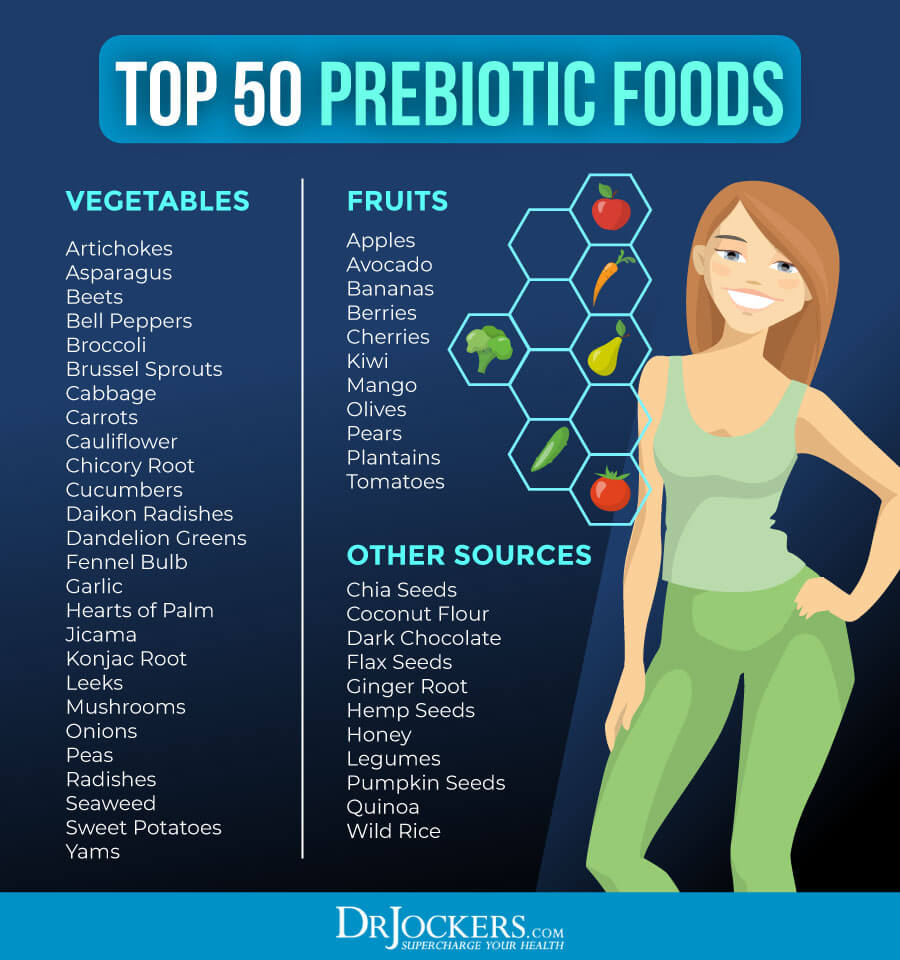
Human Microbiome Project
The research committed to by The Human Microbiome Project (HMP) discovered an amazing fact. There is 10 times as much DNA found in the bacteria that inhabit our bodies than the number of genes and DNA that complete our own genetic makeup. Since this research, scientists have learned that the diversity of bacteria (microbiota) is as unique to each individual as we are physically and genetically different. (8)
The community of bacteria that colonize our digestive tract is referred to as a microbiome. The bacteria in our intestines are of increasing importance because of their critical association with our nutritional needs and health we are continually learning. The increase of bad bacteria and decrease of friendly bacteria correlate to numerous types of health problems and diseases.
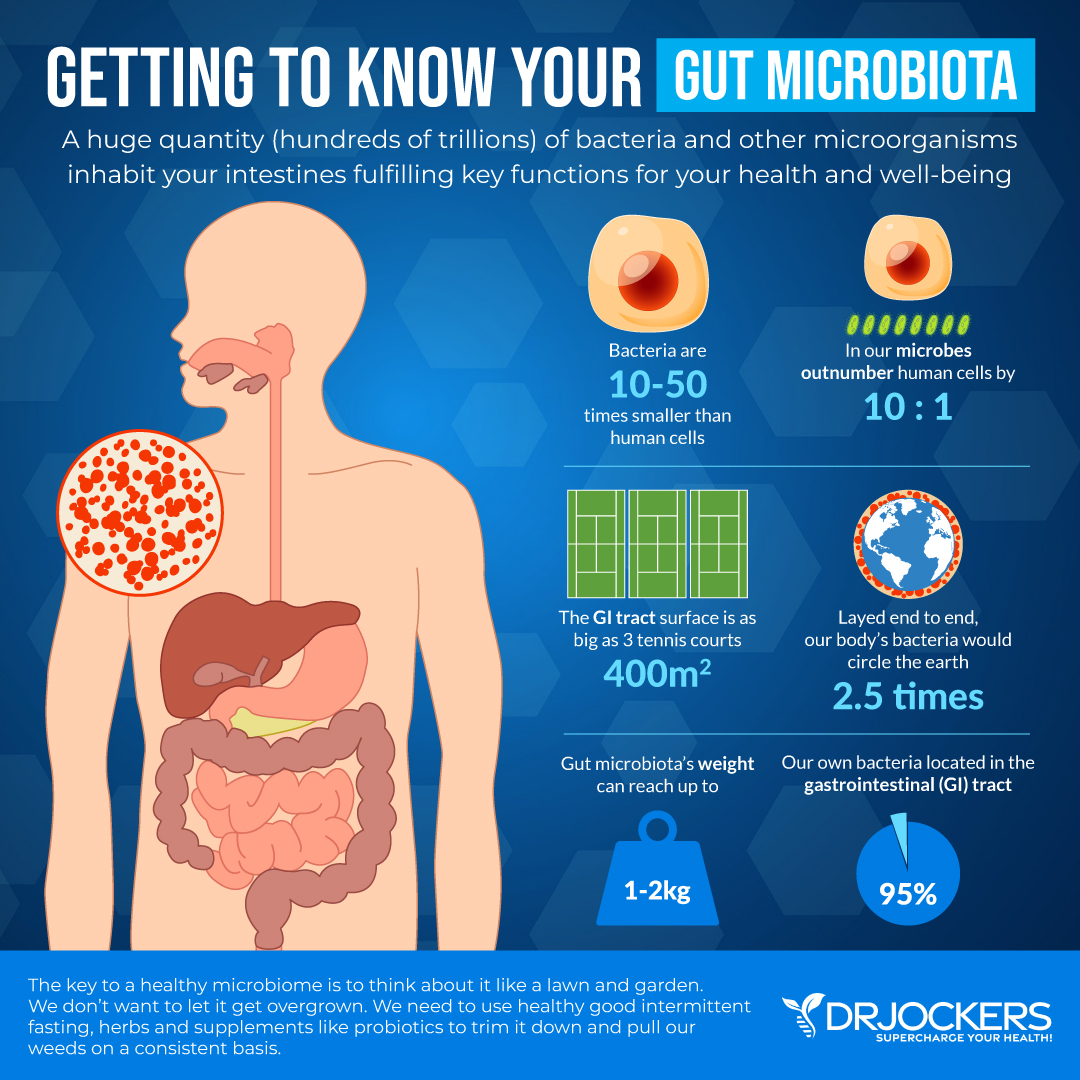
Benefits at Every Age:
The benefit of prebiotics starts at conception. Prebiotics are associated with the development of the systemic immune system, or the whole body’s immune function, and benefit babies while they are still in the mother’s womb (7).
Children have shown numerous benefits such as the reduced risk of eczema, an increase in metabolism and growth, and an increased feeding tolerance to dairy by inhibiting the development of allergies. For these reasons and more, prebiotics are now added to infant formula.
An outstanding amount of research demonstrates that prebiotics promote T helper cells which are vital for a healthy immune system. (1, 2, 7, 9)
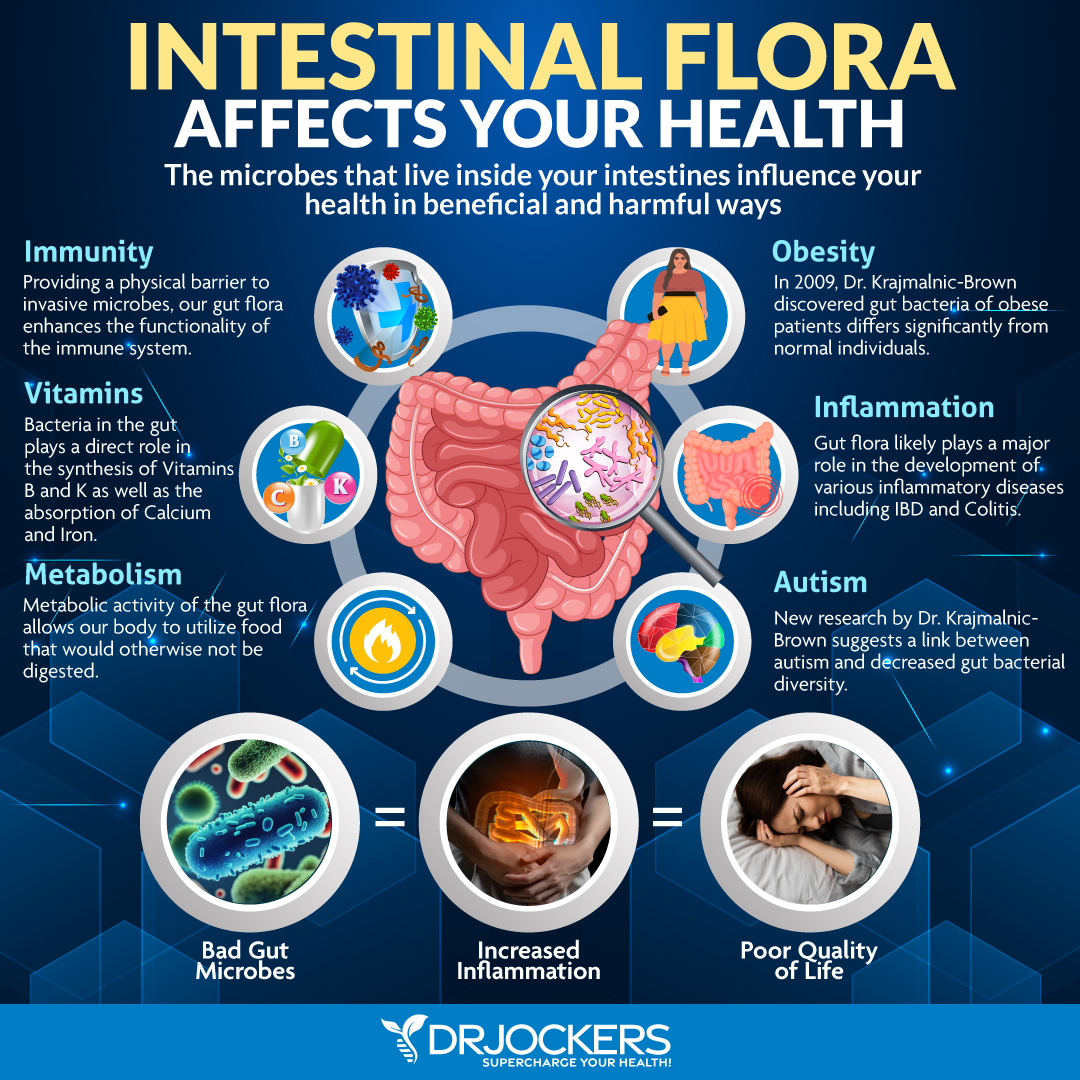 Improved Systemic Immunity:
Improved Systemic Immunity:
Friendly bacteria not only provide the gastrointestinal tract with healthy immunity, but they also improve systemic immunity in the entire body. Increased permeability of the intestine in people with leaky gut for instance has a higher risk for pathogens to squeeze through the holes and colonize other organs in the body.
Decreasing inflammation of the intestine and supporting an environment for healthy bacteria to thrive decreases the risk for pathogens to wreak havoc.
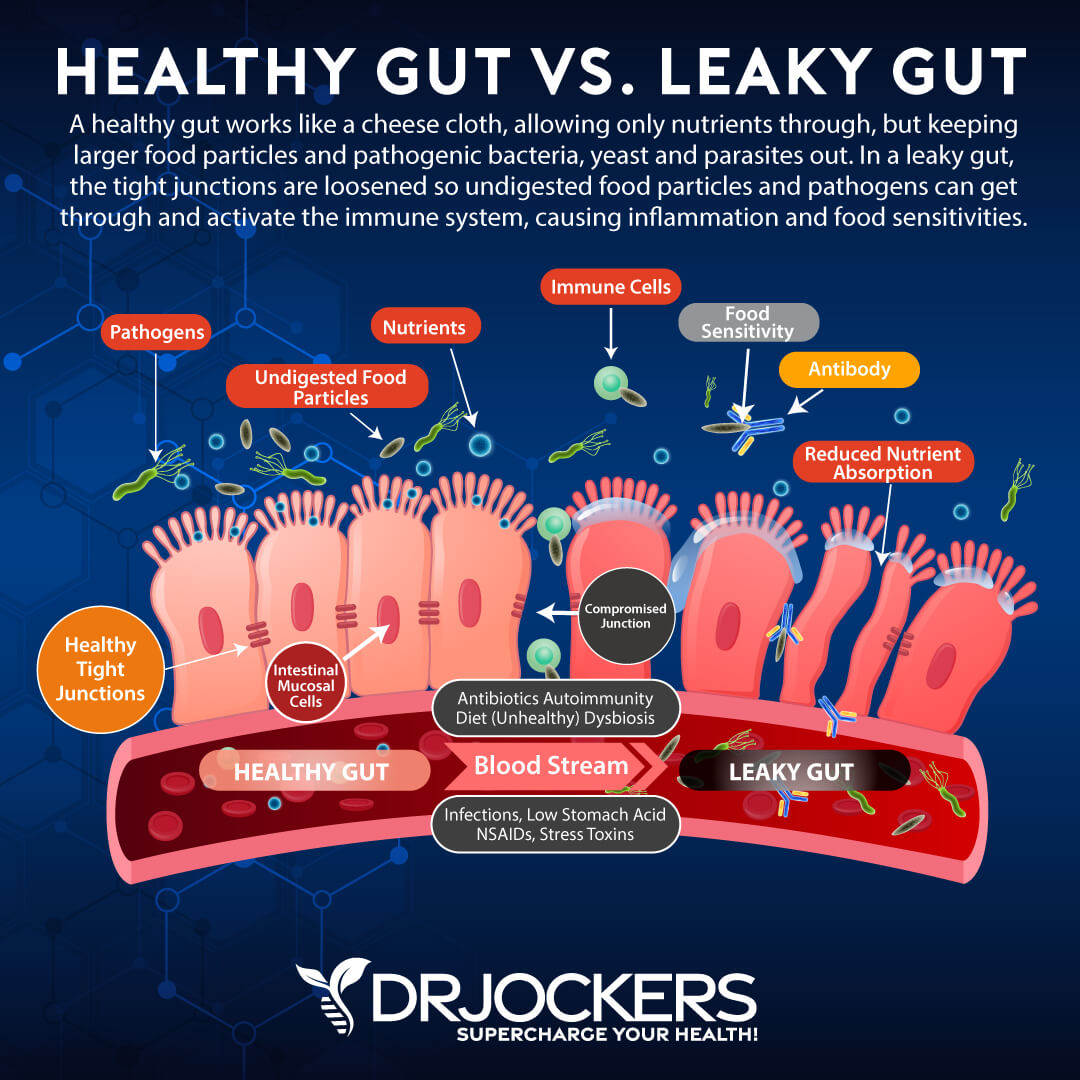
Antibiotics Deplete Your Supply:
Antibiotics reduce intestinal microbial populations and may completely deplete some species of friendly bacteria. So after you have a well-nourished flower bed, the dog decides he is going to dig up the flowers and leave gaping holes with missing soil.
These conditions set the stages for pathogenic bacteria to overpopulate and leave you with the negative immune responses you may have previously suffered from (7).
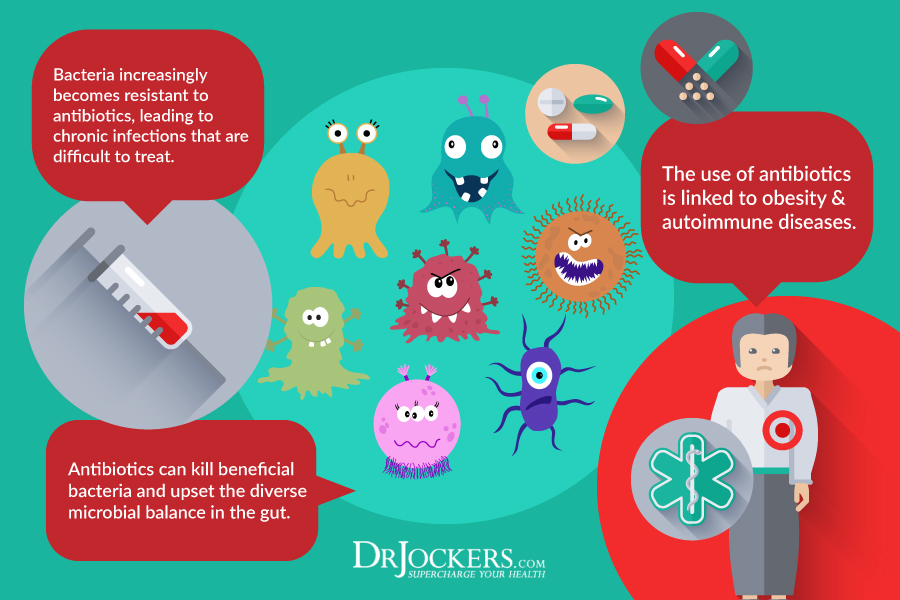
Prebiotics Alleviate Symptoms of IBD
The addition of prebiotics to the diet has been shown to decrease inflammatory bowel diseases (IBD). IBD involves the improper regulation of immune response to the community of bacteria in the gut. Those who suffer from IBD are those with Crohn’s disease, ulcerative colitis, and celiac disease for example. (7)
Crohn’s Disease: Individuals with Crohn’s disease exhibit symptoms related to inflammation in the small intestine at the start of the colon. People with Crohn’s disease have a reduced diversity of good bacteria in their gastrointestinal tract possibly as a consequence of antibiotic treatment (7). As a result, these individuals are more exposed to pathogenic organisms that are drug resistant.
Ulcerative Colitis: Prebiotics have shown significant benefits in alleviating symptoms in those with ulcerative colitis. Individuals will suffer from abdominal pain, urgent bowel movements, bloody stool, and other symptoms affected by inflammation of the large intestine. (1)
Celiac Disease: This form of bowel disease is characterized by the chronic inflammatory state of the small intestine triggered by gluten intolerance (9). Americans receive an estimated 70% of prebiotic sources from wheat and 20% from onions (5). Have our diets become so far removed from nature that we have forgotten how delicious other foods are such as garlic and yams?
The immune system in these patients remains on the defense against both good and bad bacteria and fights to prevent any bacterial colonization. Symptoms exhibited include abdominal discomfort, bloody stool, pain in the reproductive tract, and an allergic response in the skin.
Celiac disease patients typically have high levels of pro-inflammatory bacteria. In cases where friendly bacteria concentrations are extremely low, individuals with celiac disease may receive some of the greatest benefits from incorporating prebiotics into their diet. (9)
Prebiotics Improve Digestion
Symptoms of IBS (irritable bowel syndrome) can be mistaken for a type of inflammatory bowel disease except that IBS does not cause the chronic inflammatory condition of the gut as might celiac disease. Prebiotic supplementation has been shown to improve the gut microbiome so significantly that symptoms and worsening conditions are less likely.
Prebiotics are a beneficial supplement for everyone because they combat both diarrhea and constipation, prevent IBS and IBD, increase the absorption of nutrients such as calcium, and aid the detoxification of intestinal cells (6). Some research even suggests that prebiotics may have roles similar to antioxidants by neutralizing carcinogens while some varieties specifically compete with pathogens.
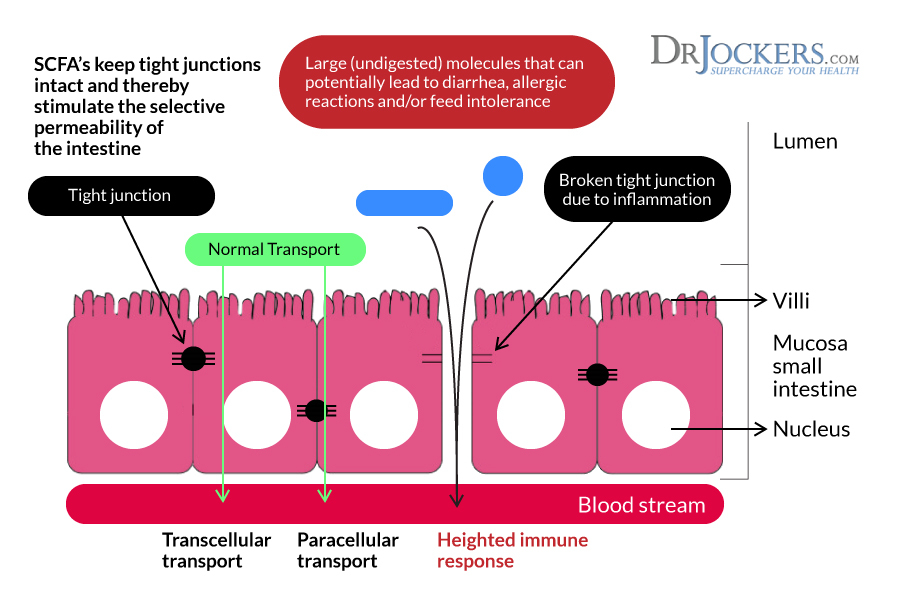
Prebiotics Prevent Cancers
Prebiotics produce key short chain fatty acids (SFCA’s) such as butyrate, acetate, propionic, and valerate. These SFCA’s help to strengthen the gut lining, maintain proper colonic pH, and improve energy levels and immune function. The production of SCFA’s helps prevent cancer by:
Reducing Colonic pH: The two most well understood friendly bacteria that colonize the human body are bifidobacteria and lactobacilli (2). These two types of microbiota produce lactic acid which protects the colon by decreasing pH.
A lower pH in the colon reduces colon cancer risk by inhibiting pro-cancer enzymes (6). Lactic acid bacteria also produce short-chain fatty acids such as butyrate. (1)
Increasing Butyrate Levels: Butyrate is one of the best food sources for friendly bacteria as well as for cells that line the intestine (7). Increases in butyrate have been linked to cellular suicide of cancer cells known as apoptosis, and increased concentration of normal cells. Butyrate is also shown to correlate with increases of the antioxidant, glutathione, in colon cells. (6)
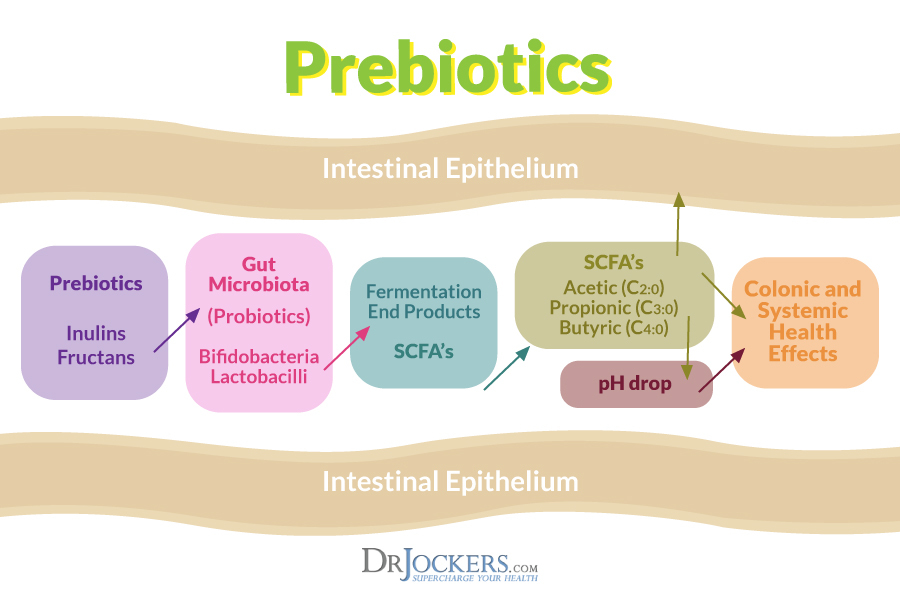
Prebiotics Regulate Glucose
Researchers have found that prebiotics taken regularly can limit hunger and reduce risks of type 2 diabetes by maintaining healthy glucose regulation (1). Individuals with diabetes who supplemented their diets with prebiotics had increased amounts of healthy lactobacilli and bifidobacteria and a significant reduction in coliform bacteria. Although coliform bacteria in small amounts may not cause harm, they are also linked to illness and abdominal discomfort.
Whether or not you suffer from blood sugar imbalances, prebiotics can assist in regulating sugar metabolism and may improve your overall health. Studies have shown that prebiotics help control appetite, prevent weight gain, and may have a desired laxative effect in newborns without negatively affecting weight gain and development (3).
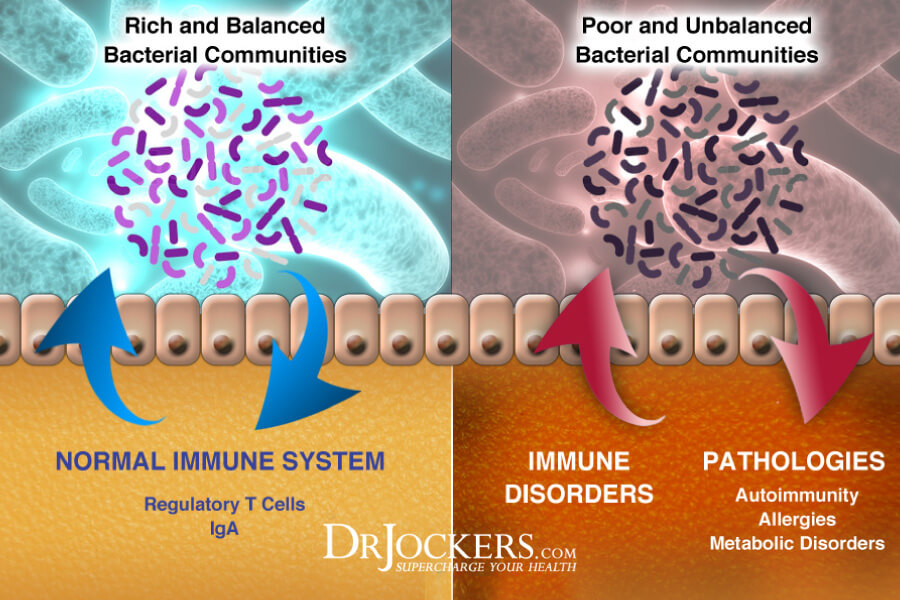
Prebiotics Control Blood Pressure
One study observed the effects of probiotics and prebiotics on over 6,500 people. Individuals who supplemented their diet with yogurt alone not only had lower insulin resistance and decreased blood sugar concentrations, but they also had significantly lowered triglyceride levels and blood pressure.
Although further support is still needed, researchers believe that the increase in butyrate inhibits the production of liver cholesterol (6).
A New Topic for Discussion
The term prebiotic was first coined in 1995 and is a relatively new topic for discussion (7). Researchers do not yet have a full understanding of all the health benefits that prebiotics have on the human body.
Some of these studies are beginning to observe that prebiotics may play a role in endocrine or hormone health and may even provide more health benefits to the brain than currently understood (3).
The Synergism of Prebiotics and Probiotics
The combination of prebiotics when taken daily with probiotics has a synergistic health advantage. After all, why would you only plant seeds and not add fertilizer or vice versa? The nutritional supplementation of the two combined is called synbiotics (7).
Some foods that act as synbiotics include kimchii, sauerkraut, and pickles. These are all fermented foods that utilize great prebiotic fibers with carrots, cabbage, and cucumbers. Radishes are also often used. Herbs like ginger that have prebiotic qualities are often used as well.
One supplement that I use clinically that has both probiotics and prebiotics is SBO Probiotics – Ultimate. This is a soil based probiotic that contains humic and fulvic acids that help to detoxify the body while supporting the natural bacillus strains that enhance the microbial environment in our gut.
Recommendations for Taking Prebiotics:
The diversity of every individual’s gut microbiome is as varied as our genetic differences. One major finding of the Human Microbiome Project was that each adult has significantly different varieties of bacteria living in the body (8).
After all, there are too many factors to count that affect the bacteria living within and on us. From the freshness and availability of foods provided to us based on our geographic location to the environmental factors that we were exposed to during our upbringing such as antibiotics, immunizations, and whether or not we were fed breast milk or infant formula all play a role in determining the concentration and type of good and bad bacteria.
1. Start Small and Work Up: If you start a prebiotic or probiotic regimen, begin first by taking small doses and gradually increase to the recommended use. This will help you avoid abdominal discomfort or diarrhea that may result.
2. Consume Both Fermented Foods and Prebiotic Foods: Although there are certain circumstances that are best suited for probiotic supplementation, researchers recommend the combination of both probiotics and prebiotics in your daily diet. Consuming high quality fermented foods such as kimchi, sauerkraut, pickles, etc. is the best way to do this!
3. Snack on Prebiotic Foods: Munch on raw carrots, jicama, cucumbers, flax crackers, berries, apples etc. throughout the day.
4. Dandy Blend: Try out Dandy blend which tastes surprisingly like coffee and is a combination of both dandelion root and chicory root.
5. Digestive Enzymes: Supplementing with digestive enzymes to support healthy digestion may be helpful to you.
6. How Much Prebiotics Should I Consume?: The recommended dose for daily health and wellness is 500-1000 mg/day. Individuals with autoimmune conditions, digestive disorders, and food sensitivities may benefit from increased prebiotic concentrated doses. In particular, if your SCFA levels are low then added prebiotics can be especially helpful.
7. Prebiotic Supplements: If taking an oral prebiotic supplement, buy a supplement that contains either arabinogalactans or both inulin and oligosaccharides for optimal effect.
8. Great for Pregnancy: Pregnant and nursing mothers are recommended to take prebiotics because of the known benefits transferred to the baby.
9. Prevents Against Yeast Overgrowth and UTI’s: Maintain a healthy prebiotic supplementation regimen to avoid yeast overgrowth and related urinary tract infections
10. Gut Repair Supplement: This contains compounds to help heal an irritated gut lining and nourish a healthy microbiome. I use this with most of my clients that have leaky gut and challenging digestive systems and/or auto-immune diseases.
Inflammation Crushing Ebundle
The Inflammation Crushing Ebundle is designed to help you improve your brain, liver, immune system and discover the healing strategies, foods and recipes to burn fat, reduce inflammation and Thrive in Life!
As a doctor of natural medicine, I have spent the past 20 years studying the best healing strategies and worked with hundreds of coaching clients, helping them overcome chronic health conditions and optimize their overall health.
In our Inflammation Crushing Ebundle, I have put together my very best strategies to reduce inflammation and optimize your healing potential. Take a look at what you will get inside these valuable guides below!
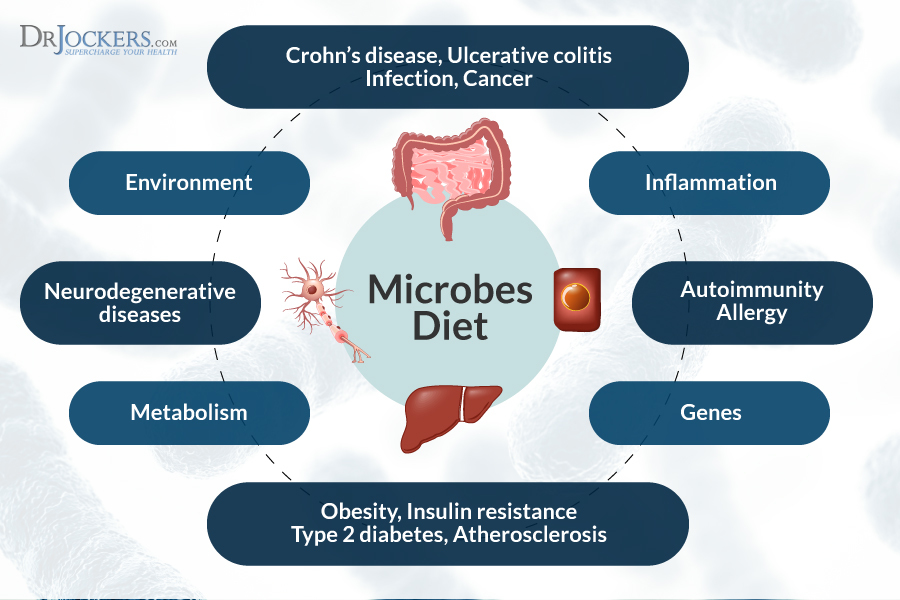
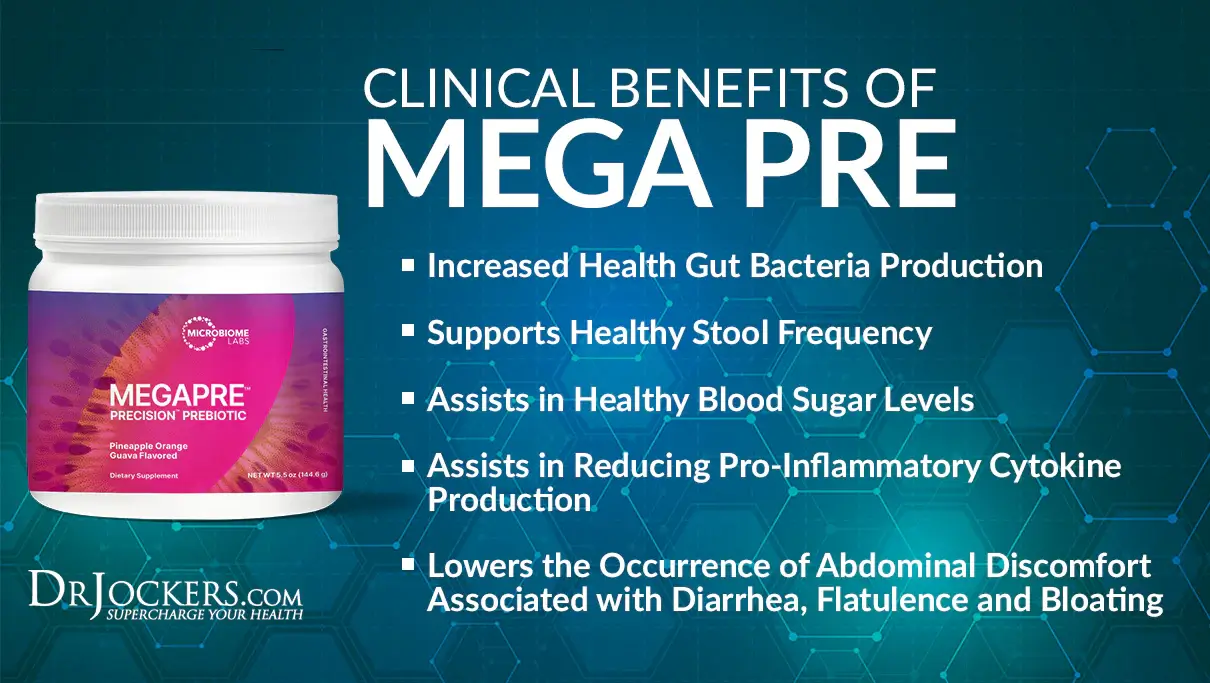
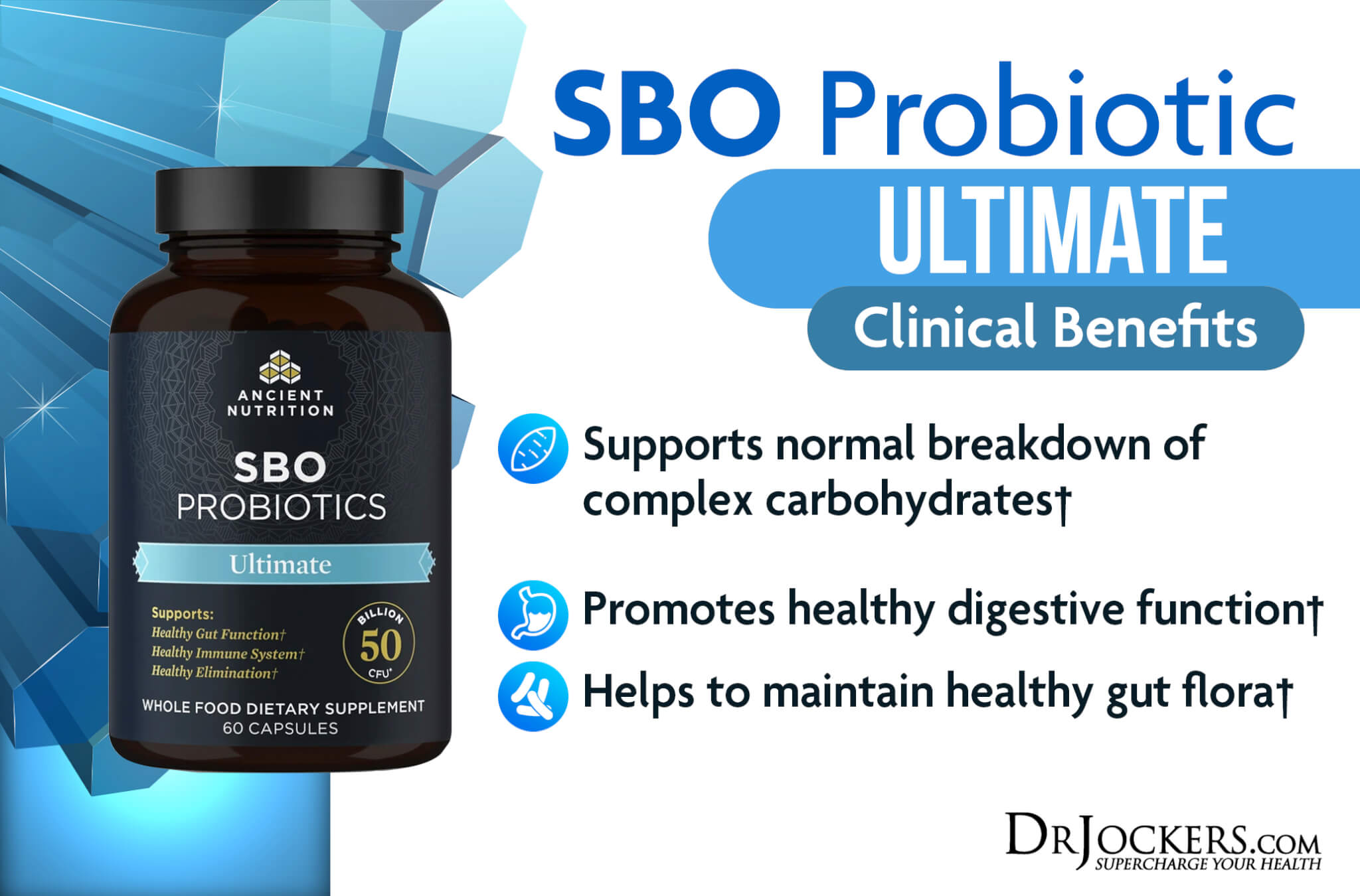





Some of these foods (like yams and wild rice) are eaten cooked. Does cooking prebiotic foods lessen their effectiveness?
Hey Deane, great question and yes, these foods will still have prebiotic benefits after cooking.
Even if it was cooked using cooking oil?
Probably depends on the oil! https://drjockers.com/healthy-fats/
My resident flora (bacteroides sp, bifidobacterium SP, enteroccocus SP, eschericia coli, lactobacillus SP) is very low.
My virulence factors intestinal flora (katalase and urease) are to high. I have blastocystys species (which didn’t go away after taking medication clinoquiol). My gut immuno mucosa state: I have very high sIgA and beta defensine 2 values. Also I have CBS and NOS and mutatiins not favorable for the gut. Is it ok for me to take pro biotics or is it better to only take pre biotics? What can you advise My to do or what supplements to take?
I am sorry to hear this Ruby! If your good bacteria levels are low, than supplementing with probiotics may be very helpful. But often not right away. This is the program that I typically use https://drjockers.com/regain-your-terrain-digestive-health-protocol/
For blasto and other parasites this is what we use: https://drjockers.com/type-parasites/
Dr. I’m 51 years old and have had alopecia since I’m 14. Eight years ago I read an article about two Italian boys who went gluten free and cured their alopecia. I have a first cousin who has celiac so I figured there might be some truth to the gluten explanation. One year into the diet I stopped sleeping. (The hair never came back-though a few eye lashes did appear.) I literally went 60 days without sleep. The only sleep I had came with prescription sleeping pills which only gave me the feeling of having been temporarily unconscious. The pills after a month gave me memory blanks and other horrors so I stopped. A month later I began to get a few hours a night and over time the sleep got better, but it never returned to pre gluten free days. I was at the time going through an ugly divorce, so I always assumed that that was the cause of the insomnia….Five years later I went gluten free again. And again, one year into the diet, with no warning, the severe insomnia returned. Any thoughts?
Hey Gary, there could be some other issues going on including cross-reactive food sensitivities other than gluten. It is hard to say without more information. I would suggest working with one our coaches and getting some functional lab work done to get to the bottom of this. You can email michael@drjockers.com if you are interested.
Hi doctor how about parboiled rice have a i eat organic kimchi everyday
Hey Lin, not a huge fan of rice on a regular basis as it is high in starchy carbs, kimchi is a good probiotic for many people though!
I have great faith in probiotics and and prebiotics…..I also take IP-6 to quadruple my T-Cells natural killer cells…..my questions is this….I’ve seen pure maple syrup and black tea listed as prebiotics along with the ones you list. Is that also your findings?
Hey Carol, yes both of those can be considered prebiotics as well as green tea! I would steer away from doing too much maple syrup though considering the sugar content is pretty high.
I was recently on four separate courses of antibiotics (amoxycillin twice and cephalexan twice) for teeth infections in the last four months! I have since developed a reaction that has left me feeling intensely feverish, weak, tired and especially ill feeling with nausea and loose bowels after meals for three weeks now. I have had blood labs, a stool sample and a chest x-ray done and all check out ok. Am I suffering a reaction from the antibiotics and how can I prevent further issues, get rid of the feverish feeling and restore my health? Thank you!
So sorry to hear about this Lin, I’d recommend reaching out to michael@drjockers.com and getting on a plan to restore your gut health as it has likely been changed quite a bit.
Hi,
I have been suffering from gastrointestinal pain, bloating and IBS related symptoms for 15+ years. I’ve seen many doctors and been put through an insane number of tests…all of which result in no answers. I am trying the low FODMAP diet but am now worried about my healthy gut bacteria as many pre & pro biotics are eliminated. Do you have any suggestions?
Thanks so much
So sorry to hear this! Yes, I would recommend our Digestive Health restoration program here: https://drjockers.com/the-digestive-health-restoration-program/
How come prebiotics feed the good bacteria but not the bad ones?
Actually they feed both good and bad bacteria. If you have an overgrowth of bad bacteria it is a better idea to weed those out with anti-microbials or with probiotics before focusing on prebiotics.
Hi there,
unfortunately, the list of prebiotics usually contains a lot of foods with high oxalate contents. This is not good for HIT. Folate is another problem. Maybe supplementing with prebiotics would be an idea? Yogurt and red cabbage are great, so is ginger, onions only at times. What would you recommend?
Yes you can choose the low-oxalate foods that work best for your body. We also have a great prebiotic formulation here: https://store.drjockers.com/products/mega-prebiotic
When eating prebiotic and probiotic foods, do they have to be raw? Could you do a canned fruit in a natural syrup with no added sugar? Also, how do you know you’re getting enough prebiotic and probiotic nutrients in your daily diet? And what is the best way to choose a yogurt with live active cultures? Especially for the dairy free brands.
You should look for an organic yogurt. For prebiotics – you want to try increasing or in many cases decreasing the quantity until you find that you have reduced gas/bloating and healthy bowel movements.
Hi .I have bile acid malabsorbtion, and ibd. I went to buy supplements for probiotics and probiotics but was told I can’t take them because I take antidepressants. What can I do ?.
Yes you can take probiotics and they are safe even if you are on antidepressants. I would recommend taking the SBO Probiotics: https://store.drjockers.com/products/sbo-probiotics-ultimate
I am trying to work on my diet to heal my gut, I have hypothyroidism and sensory issues from being autistic. Any recommendations for a picky eater?
Sorry to hear this! Here is a helpful article for you: https://drjockers.com/autism/
Thank you for all you do!
Thank you!